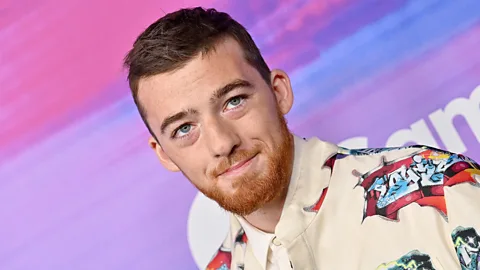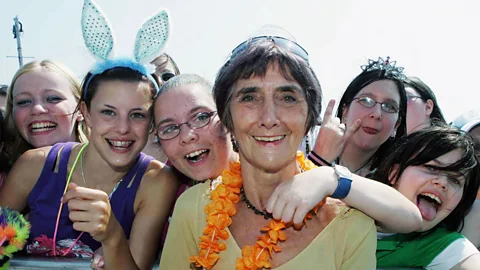Must the show go on? How TV series handle the death of a star
 Getty Images
Getty ImagesAngus Cloud's posthumous return to the screen brings questions about the "right" way to carry a story forward when a key cast member has passed away.
Television is no stranger to the sort of shocking deaths that demonstrate the medium's powers of imagination and surprise: the death in a private jet that set Succession fans (and actors) aflame, for example, or Game of Thrones' Ned Stark losing his head in the town square. But the real, unexpected death of an actor is a sobering reminder of the fragile reality behind even the most transportive fictions.
Actors dying during the production of a television series isn't an uncommon occurrence, yet it has recently befallen several of the most talked about shows on TV.
Fans have been wondering how Max's Euphoria will handle the loss of Angus Cloud, who died last July of an accidental overdose at the age of 25. The network's approach will hopefully be revealed in 2025 when the drama's third season is set to debut, despite news that production has again been put on hold, potentially indefinitely. Max declined to comment on the direction of the story, but the last viewers saw of Cloud's character Fez, he had just been shot by police. In the meantime, one of Cloud's final onscreen appearances, in the horror film Abigail, which wrapped filming before his death, arrives in US theaters on 19 April of this year.
Meanwhile, Cloud's Abigail co-star Giancarlo Esposito recently joined Shonda Rhimes' upcoming White House-set The Residence, in a role that was originally to be played by the late Andre Braugher, who died of lung cancer last December. Lance Reddick, who appears as Zeus in the first season of Percy Jackson and the Olympians, died from heart disease last March, leaving Disney to decide how to approach the pivotal character in season 2. And Channel 4's royal family satire The Windsors is faced with how to move forward after Dame Haydyn Gwynne, who played Queen Camilla, died from cancer in October.
How, or whether, a series chooses to forge ahead following the death of an actor involves a complex and sensitive array of considerations, including the nature of the series, the character's place in the story, and the circumstances of the actor's death. Perhaps above all is a desire among television creators to respect the legacy of the late actor, and the devotion that person inspired from colleagues, loved ones and fans.
"You're dealing with the tragic loss of somebody you loved deeply," says Dante Di Loreto, an executive producer of the teen-driven musical dramedy Glee, which aired on Fox from 2009 to 2015 and is currently streaming on Hulu. Cory Monteith, who played Finn on the popular series, died from an overdose in 2013. "You're also managing the feelings and needs of the hundreds of people who are dependent upon and executing the show," Di Loreto says.
Moving on without a late actor presents a variety of creative challenges, depending on the emotional tenor of the show and its relationship to audiences. How an actor's death is handled within the world of a series "depends on the pace and the framing of the genre," says Tim Teeman, senior culture editor and writer at The Daily Beast. "It might be easier for a crime or action show to go fairly big and dramatic with a character's death, but if you're working on a gentler canvas, you might choose a gentler outcome," Teeman says.
Riverdale, the teen soap based on the Archie Comics characters, for example, is rife with twists and turns; following the death of Luke Perry from a stroke in 2019, his character Fred Andrews was killed in an offscreen hit-and-run accident. A romantic comedy like And Just Like That…, on the other hand, addressed the sudden death of Willie Garson during production on season 1 by writing his character, Carrie's best friend Stanford, off the series and into a Tokyo monastery – a quizzical twist, but hardly out of step with the oddness of the Sex and the City reboot.
In a social media tribute to Garson, Sarah Jessica Parker referred to their friendship in both deeply personal terms and as "a shared professional family," indicating how close-knit behind-the-scenes connections can be. For creative decision-makers and fans alike, emotional stakes run high when an actor dies but the show carries on without them.
Tending to a television family
"It's an immense business operation," Di Loreto says of managing a television production. "But because it's an art form, and you're dealing with artists, there's a great emotional commitment to what you're doing." On top of processing his personal shock over Monteith's death, which happened while Di Loreto was in production on the HBO film The Normal Heart, the producer was tasked with helping to shepherd the entire Glee team through a traumatic loss.
"The first thought was, how do we take care of the existing cast?" Di Loreto says, "Lea Michele, specifically? How do we make sure she's safe?" Michele's relationship with Monteith at the time of his death added a layer of complexity to the loss and drew particular attention from the press.
"When you have two characters and two performers who are romantically involved, it compounds the grief and the need for us to take more of a parent's position, to take care of your family members at the same time you're trying to take care of your own emotional needs," Di Loreto says.
"We had been making the show together as a family, however dysfunctional," Di Loreto recalls. "There was a need among the cast to care for each other. We needed to allow the space for that and for people to grieve and express their shock and anger."
 Getty Images
Getty ImagesThe circumstances of Monteith's death, an overdose from alcohol and heroin following a struggle with addiction, was a source of conflicting feelings for Di Loreto and others working on the show, he recalls. "He didn't die because of a tragic accident; he died because of his own actions," Di Loreto says of Monteith. "And he was most likely having a really good time, so there's a lot of mixed emotions about that."
Creating space to grieve on set was especially important, given the immense spotlight on the cast in their personal lives. There was a private memorial service held on the Glee soundstage, which Di Loreto helped produce, and a season 5 episode that paid tearful tribute to Monteith's character, Finn, with renditions of "Seasons of Love" from Rent and The Pretenders' "I'll Stand By You," among others.
"Everyone wanted to celebrate and remember the best of Cory rather than highlight the mistakes that he made in his life," Di Loreto says of the decision not to reference circumstances of the actor's death in the episode.
In a 2022 podcast about the making of the show, series creator Ryan Murphy seemed to regret how quickly Glee forged ahead. "If I had to do it again, we would've stopped for a very long time and probably not come back," Murphy said.
But in addition to helping everyone behind the scenes process Monteith's death, Di Loreto also says the producers felt a responsibility toward Glee's young and devoted global fan base, who had developed strong emotional connections to the characters. "The idea of not continuing with the story would have felt incredibly disruptive and painful," Di Loreto says. Glee proceeded with its fifth and sixth seasons following Monteith's death.
 Getty Images
Getty ImagesHonoring the loss for fans
Caring for the audience in the case of an actor's death is important to maintaining their connection to the story, especially in the case of a long-running series. When EastEnders' star June Brown died at age 95 in 2022, she had played Dot Cotton on the BBC soap for over three decades. Though Dot had not appeared onscreen in the final years of Brown's life, a special episode paid tribute to both Brown and her beloved character with a grand funeral.
"We could feel the characters responding to Dot's death in the way that we were as viewers, and saying farewell to June at the same time," Teeman says. "That funeral was as much for us as it was for the residents of Albert Square," and among the best farewells to a popular character in recent memory, Teeman says.
The death of an elder matriarch may be simpler to weave into the fabric of a story, but other roles may need to be recast in order for a series to continue. "If the character is very integral to the story, or there's a deep affection from the audience, then the producers may decide they need to replace a late actor," Teeman says. The classic sitcom Bewitched, for example, saw several major roles recast when actors became ill or died, including Sandra Gould, who played nosy neighbor Gladys Kravitz following the death of Alice Pearce from ovarian cancer.
How an actor died, and their level of celebrity, are both major considerations in how producers choose to move forward, knowing that their audiences are familiar with what's happened offscreen. Fans are more informed and connected than ever, and in a fractured TV landscape, their devotion can make or break a series.
"I think producers are very keenly aware of how people are responding online, and likely more responsive to them as well," Teeman says. Back when programming was consolidated across a few major networks, a hit show like Bewitched could bank on the property's staying power in the face of cast turnover.
But it would be tough to imagine a series that rides high on the fame of its young stars, such as Glee or Euphoria, recasting a major role rather than suggesting the star is irreplaceable. In an age of close identification with celebrities, fans could likely take a recasting as an affront.
Writing a character out of the story can present a creative challenge, even in an ensemble-driven series like Euphoria. While Cloud said that at one point his character Fez was slated to be killed off in season 1, instead the soft-spoken drug dealer went on to become a more prominent part of the drama, as well as a fan favorite. In a February interview with Vanity Fair co-star Colman Domingo said Cloud's death likely "affected… the creation of season three, because [Angus] was going to be a very strong part of it." As the cast paid tribute to Cloud in the wake of his death, some fans even called for the series to be canceled, proof of the strong affinity his performance inspired.
"When a show becomes successful, it belongs to the audience," Di Loreto says. Young actors become idols with their own burgeoning careers and personal relationships to fans. Producers have their own evolving outlook on the show and may have sights on other projects. If anything comes from losing a cast member, "maybe it can be an opportunity to reinvest in why you're telling the story," Di Loreto says. "To take stock of what you care about as artists, and the fact that you're doing something together and that you need each other."
--
If you liked this story, sign up for The Essential List newsletter – a handpicked selection of features, videos and can't-miss news delivered to your inbox every Friday.
